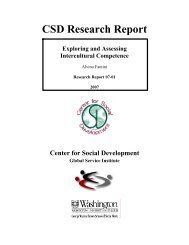Rediscovering social investment in developmental welfare state ...
Rediscovering social investment in developmental welfare state ...
Rediscovering social investment in developmental welfare state ...
Create successful ePaper yourself
Turn your PDF publications into a flip-book with our unique Google optimized e-Paper software.
R E D I S C O V E R I N G S O C I A L I N V E S T M E N T I N D E V E L O P M E N T A L W E L F A R E S T A T E P O L I C I E S :<br />
B A C K T O T H E F U T U R E<br />
theoriz<strong>in</strong>g about how to steer the results of production, emphasiz<strong>in</strong>g the full utilization of resources,<br />
<strong>developmental</strong>ism suggests that it should be possible to identify and expla<strong>in</strong> policies that lead to<br />
productivity (not just solidarity or security), prevent <strong>in</strong>efficiencies associated with poverty and<br />
reduce the costs of <strong>in</strong>security and <strong>social</strong> risk.<br />
I argue that policy-level heterogeneity can be understood us<strong>in</strong>g a <strong>developmental</strong>ist-<strong>in</strong>spired<br />
theoretical framework and that it makes sense to search for <strong>developmental</strong>ist policy clusters as<br />
opposed to a productivist world (Holliday, 2000; Lee & Ku, 2007; Room, 2002), <strong>social</strong> <strong><strong>in</strong>vestment</strong><br />
<strong>state</strong> (Giddens, 1998; Lister, 2004), or s<strong>in</strong>gle policies that are exclusively productivist (Hudson &<br />
Kühner, 2009). Social development may aid <strong>welfare</strong> <strong>state</strong> research <strong>in</strong> identify<strong>in</strong>g and understand<strong>in</strong>g<br />
how different policy dimensions of the <strong>welfare</strong> <strong>state</strong> <strong>in</strong>teract. These perspectives are mutually<br />
beneficial. Crossnational comparative research lacks a theoretically coherent productive rationale for<br />
the <strong>welfare</strong> <strong>state</strong> while <strong>social</strong> development theory has not been fully <strong>in</strong>tegrated <strong>in</strong>to <strong>social</strong> policy<br />
th<strong>in</strong>k<strong>in</strong>g <strong>in</strong> the developed world. 18 The latter is <strong>in</strong> need of focus, ref<strong>in</strong>ement, and application while<br />
the former is <strong>in</strong> need of theoretical guidance and policy relevance. A <strong>social</strong> development-<strong>in</strong>spired<br />
(i.e., <strong>developmental</strong>ist) framework can offer a set of policy-relevant pr<strong>in</strong>ciples with which to (1) analyze<br />
exist<strong>in</strong>g policies <strong>in</strong> terms of reth<strong>in</strong>k<strong>in</strong>g dichotomies and (2) make predictions about the productive<br />
effects of exist<strong>in</strong>g <strong>social</strong> policies.<br />
I situate what I refer to broadly as <strong>developmental</strong>ist policy <strong>in</strong> an older, classical political economic<br />
tradition that is partly dist<strong>in</strong>ct from standard economics (see Johnson, 2010, pp. 84–88). This older<br />
political economic tradition emphasizes the implausibility of th<strong>in</strong>k<strong>in</strong>g about distribution and<br />
production separately. This tradition rem<strong>in</strong>ds us that the <strong>welfare</strong> <strong>state</strong> should not simply be seen as a<br />
compensatory response to the <strong>social</strong> costs of 19 th century capitalism, but also as a contributor to<br />
susta<strong>in</strong>able economic development and growth. Unfortunately, little effort has been exerted to<br />
consider <strong>social</strong> policy from the perspective of the classical political economic tradition. The most<br />
extensive attempts to understand the relationship between economic and <strong>social</strong> policy <strong>in</strong> the<br />
developed world, and contest the efficiency-equality tradeoff, have occurred <strong>in</strong> the Nordic context<br />
(see Johnson, 2010, pp. 81–84 for discussion of the limitations of the Nordic or <strong>social</strong> democratic<br />
approach). The <strong>social</strong> development perspective can be redef<strong>in</strong>ed to <strong>in</strong>form a Nordic-<strong>in</strong>spired<br />
political economy that has largely reflected vague pr<strong>in</strong>ciples or values but not spoken to specific<br />
<strong>social</strong> policies or their economic consequences. Formulat<strong>in</strong>g <strong>developmental</strong>ist policy pr<strong>in</strong>ciples and<br />
identify<strong>in</strong>g DWSPs requires that the <strong>in</strong>sights of <strong>social</strong> development theory, political economic ideas<br />
of scholars like Myrdal and <strong>welfare</strong> <strong>state</strong> categorizations be synthesized. The follow<strong>in</strong>g section<br />
translates <strong>developmental</strong>ist <strong>in</strong>sights <strong>in</strong>to the <strong>welfare</strong> <strong>state</strong> context <strong>in</strong> order to provide a framework<br />
for deriv<strong>in</strong>g expectations about potentially productive <strong>social</strong> policies.<br />
effects that may be associated with large ongo<strong>in</strong>g and preventive <strong>social</strong> <strong><strong>in</strong>vestment</strong>s. As Esp<strong>in</strong>g-Andersen (2002, p. 5)<br />
notes, ―the Third Way may be criticized for its unduly selective appropriation of <strong>social</strong> democratic policy.‖ One example<br />
is its ―tendency to believe that activation may substitute for conventional <strong>in</strong>come ma<strong>in</strong>tenance guarantees.‖<br />
18 Ow<strong>in</strong>g to the distance between development studies and the study of <strong>welfare</strong> policies <strong>in</strong> the developed countries<br />
(Mkandawire, 2007), the application of <strong>social</strong> <strong>developmental</strong>ism has tended to be relegated to the poor and <strong>in</strong>active;<br />
<strong>in</strong>voked almost exclusively on behalf of grassroots, nongovernmental, or private sector solutions. While it may acquire<br />
currency <strong>in</strong> m<strong>in</strong>imalist <strong>welfare</strong> <strong>state</strong>s or <strong>in</strong> the aid to third world context, it may rema<strong>in</strong> negligible <strong>in</strong> its contribution to<br />
<strong>in</strong>form<strong>in</strong>g larger policy debates <strong>in</strong> the developed world. Indeed, it may owe its current rather marg<strong>in</strong>al status to its distance<br />
from these larger <strong>welfare</strong> <strong>state</strong> <strong>social</strong> policy literatures and the population on which it is focused (i.e., poor <strong>welfare</strong><br />
clients). This study attempts to translate some of its basic ideas (many of which are implicit <strong>in</strong> northern European<br />
<strong>welfare</strong> <strong>state</strong>s) to these larger literatures.<br />
C E N T E R F O R S O C I A L D E V E L O P M E N T<br />
W A S H I N G T O N U N I V E R S I T Y I N S T . L O U I S<br />
13
















